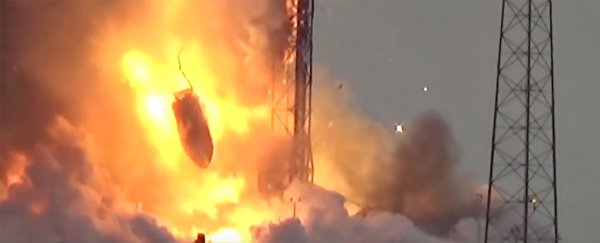The catastrophic explosion of one of SpaceX's Falcon 9 booster rockets earlier in the month could delay further launches for the private space company by up to 1 year, according to one of its primary competitors.
Tory Bruno, the president and CEO of rival space venture, United Launch Alliance (ULA), says that figuring out the causes of the SpaceX launch failure – to make sure it doesn't happen again – may take Elon Musk's company several months at the earliest.
"It typically takes nine to 12 months for people to return to flight," Bruno told Irene Klotz at Reuters. "That's what the history is."
It's worth bearing in mind that Bruno is the head of one of SpaceX's most serious commercial competitors – meaning we need to take his comments with a grain of salt. Not only could he have a vested interest in telling the public that SpaceX could be grounded for the next year, but the remarks could also generate publicity for his own company in the process.
At present, SpaceX hasn't commented on Bruno's comments or explained how long the grounding time-frame may be, so we need to remain a little skeptical for now.
That said, if we take his insights at face value, we can assume the ULA chief knows what he's talking about.
His company – a joint venture run by industry giants Lockheed Martin and Boeing – just pulled off their 111th successful launch today: an Atlas 5 rocket carrying a NASA probe into space, for an ambitious mission to collect samples from an asteroid some 121 million miles (195 million km) away.
While that's all going on, back on Earth, SpaceX will be kept busy focussing on a task that's almost as challenging. In the aftermath of explosive launch failures, Bruno says the core difficulty has "always been figuring out what went wrong on the rocket, being confident that you know … how to fix it and then actually getting that fix in place".
Details from SpaceX on what actually went wrong during the lead-up to its September 1 test firing have so far been limited, as the company is only at the beginning of its investigation into the cause of the Falcon 9 explosion.
That explosion resulted in the destruction of a very costly payload: a communications satellite called Amos–6, valued at approximately US$200 million. Amos–6, which was owned by Israeli company Spacecom, was going to be used by Mark Zuckerberg and others to provide internet access to areas like sub-Saharan Africa.
"At the time of the loss, the launch vehicle was vertical and in the process of being fuelled for the test," SpaceX explained in its most recent statement regarding the accident, issued a day after the explosion. "At this time, the data indicates the anomaly originated around the upper stage liquid oxygen tank. Per standard operating procedure, all personnel were clear of the pad. There were no injuries."
The company says it is reviewing "approximately 3,000 channels of telemetry and video data covering a time period of just 35–55 milliseconds", to analyse the problem further, in addition to investigating the extent of damage incurred by the launch pad.
But, as Bruno told Reuters, making repairs to the damaged launch pad will be a minor issue compared to understanding what exactly caused the Falcon 9's rocket fuel to ignite. "Historically, it had never been the pad that's taken the longest time," he said.
SpaceX's probe into the explosion won't be purely internal either, and is expected to involve industry partners and representatives from NASA, the Air Force, and the Federal Aviation Administration (FAA), with up to 20 investigators independently analysing raw data from the accident.
But there are hopes that SpaceX's postponements won't be as severe as Bruno has predicted. Last year, another of the company's Falcon 9s exploded after launch, and the delay in operations lasted less than six months.
Ultimately, this new era of private space companies conducting commercial rocket launches is still so recent that nobody knows for sure how long it will take to recover after disasters like this.
After losing the communications satellite, Spacecom CEO David Pollack told the media it would now take considerable successful launches from SpaceX to restore his confidence in their services.
"I don't know how many," he said, "but several safe flights."
Others – who didn't sacrifice a $200m satellite – are more upbeat, pointing out that SpaceX has enjoyed far greater successes than failures in its still-young history.
"Though this might seem a setback for the private space industry, it is really a testament to how far it has come. Musk will try again, and he won't be alone," Serge Plattard from the European Space Policy Institute wrote for The Telegraph last week.
"Already there are over 1,300 functioning satellites in our sky, belonging to 65 countries and space operators. Both numbers are sure to grow, because space is full of opportunities."
